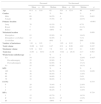To analyse the survival rate of a cohort of patients with intracranial metastases treated with radiosurgery, and to determine the factors that influence the results.
Patients and methodRetrospective analysis performed on a cohort of 126 patients undergoing radiosurgery for brain metastases. Patients treated with surgery before or after radiosurgery were excluded. Survival is analysed based on clinical (age, sex, primary tumour), radiological (number, location and volume of lesions), and radiotherapy factors (treatment dose, holocraneal radiation). Univariate and multivariate analyses were performed to determine significant prognostic factors.
ResultsA total of 225 brain metastases in 126 patients, with a mean age of 59.8±11.6years, were treated between February 2008 and April 2015. The mean survival was 8.2 months. The overall survival rates at 6months, 1year, and 2years were 60.3%, 31.5%, and 12.8%, respectively. Lung (59.5%) and breast (14.3) were the most common primary tumours, and the most common site for metastases was the cerebral hemisphere (77%) and the average volume was 10.35cc (0.2–43.5). Significant survival factors were: age under 60 (p=0.046), female (p<0.001), breast cancer (p<0.001), KPS >80 (p=0.001), SIR6 >5 (p=0.031), and GPA ≥2.5 (p=0.003).
ConclusionsRadiosurgery is an appropriate technique for the treatment of brain metastases, and the main prognostic factors include being age under 65, female, breast cancer, and good scores on Karnofsky, SIR, and GPA scales.
Analizar la supervivencia de una cohorte de pacientes con metástasis cerebrales tratados con radiocirugía y determinar qué factores pueden influir en los resultados.
Pacientes y métodoEstudio retrospectivo descriptivo sobre una cohorte de 126 pacientes diagnosticados de metástasis intracraneal tratados con radiocirugía. Se excluyeron aquellos casos en los que se realizó cirugía (antes o después de la radiocirugía). Se analizó la supervivencia en función de factores clínicos (edad, sexo, tumor primario), radiológicos (número, localización y volumen de las lesiones) y de radioterapia (dosis de tratamiento, radioterapia holocraneal). Se realizó análisis univariante y multivariante de regresión de Cox.
ResultadosEntre febrero de 2008 y abril de 2015 se trataron 225 metástasis cerebrales en 126 pacientes con edad media de 59,8±11,6años. La mediana de supervivencia fue de 8,2meses. La supervivencia global a los 6, 12 y 24meses fue del 60,3, del 31,5 y del 12,8%, respectivamente. Los orígenes más frecuentes fueron pulmonar (59,5%) y mama (14,3%), y la localización principal, los hemisferios cerebrales (77%). El volumen medio fue de 10,35cc (0,2-43,5). Se encontraron como factores significativos de supervivencia, entre otros: edad menor de 60años (p=0,046), sexo femenino (p<0,001), cáncer de mama (p<0,001); KPS >80 (p=0,001), puntuación en la escala SIR >6,5 (p=0,031), escala GPA ≥2,5 (p=0,003).
ConclusionesLa radiocirugía es una técnica adecuada para el tratamiento de las metástasis cerebrales, y entre los factores pronósticos encontrados destacan la edad menor de 60años, el sexo femenino y las mejores puntuaciones en las escalas de Karfnosky, SIR y GPA.
Article

If it is the first time you have accessed you can obtain your credentials by contacting Elsevier Spain in suscripciones@elsevier.com or by calling our Customer Service at902 88 87 40 if you are calling from Spain or at +34 932 418 800 (from 9 to 18h., GMT + 1) if you are calling outside of Spain.
If you already have your login data, please click here .
If you have forgotten your password you can you can recover it by clicking here and selecting the option ¿I have forgotten my password¿.



















